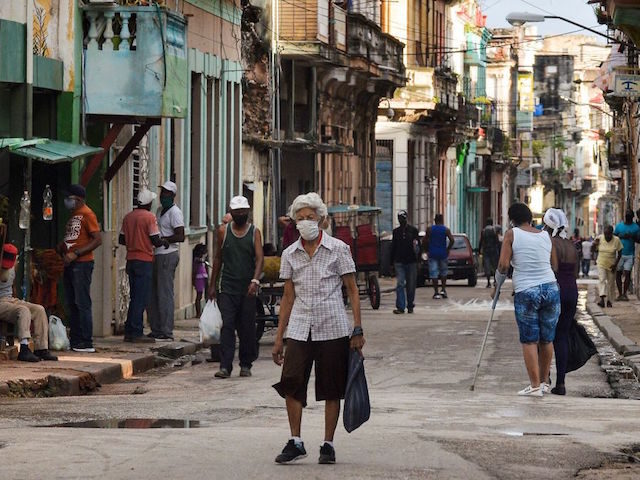Cuba marked an unenthusiastic independence day on Thursday, devoid of Communist Party propaganda events due to the Chinese coronavirus pandemic and amid increasingly brazen disinterest in the “Revolution” from the general public.
Cuba became a sovereign republic on May 20, 1902, after a prolonged war against the Spanish empire in which criollo Cubans — ethnic Spaniards born in the Americas — often took up arms like machetes and other farm equipment against the more sophisticated Spanish military.
The Communist Party often downplays the significance of May 20 because the government of the United States aided Cuban independence, though it later abandoned Cuba rather than annex it, and instead claims that “true” independence only came to Cuba after Fidel Castro’s violent takeover in 1959. Pro-democracy dissidents have, in the past, attempted to organize their own events to celebrate the founding of the nation, resulting in their violent arrests.
The Communist Party typically reserves its most lavish parades and public events for May 1, a Marxist holiday known as “International Workers’ Day.” This year, Havana officials abstained from organizing mass events for that holiday, and on Thursday, as a result of surging numbers of Chinese coronavirus cases in the island. Instead, Castro’s brother and current dictator Raúl accompanied “president” Miguel Díaz-Canel to a somber ceremony honoring the day of the death of José Martí, Cuba’s most revered founding father.
The front page of Granma, the official newspaper of the Cuban Communist Party, at press time Thursday had no overt recognition of the significance on May 20. Instead, it promoted several articles condemning the United States for maintaining friendly ties with Cuba prior to the Revolution, accusing Washington of exploitation and “neo-colonialism.” Other state-sponsored Cuban media outlets highlighted similar analyses disparaging, rather than celebrating, Cuban independence.
In comparison to its attacks on the United States and observing Cuban independence, the Cuban communist regime currently enjoys relatively friendly ties to its former colonizer, Spain, now under socialist rule. The Communist Regime notably allowed Spanish King Felipe and Queen Letizia to visit Havana on its 400th anniversary in 2019, imprisoning pro-democracy dissidents preemptively to ensure they did not disturb the royals.
The political reasons for the Communist Party not to celebrate the independence of its nation from a true colonialist system haven not obscured the fact that, after a failed attempt to present itself as a pandemic vacation destination last year, Cuba is facing a severe health crisis at the hands of the Chinese coronavirus. As of Thursday, the Castro regime has reported 128,094 cases of Chinese coronavirus and 834 deaths. Case numbers began to accelerate significantly in the past two weeks; May 2 was the last day that Cuba documented less than 1,000 confirmed cases a day, according to the World Health Organization (W.H.O.). Like the vaccine’s origin nation, China, and other rogue states like Russia and Iran, experts have questioned the legitimacy of Cuba’s coronavirus numbers given the Communist Party’s extensive history of falsifying state medical information.
“The conditions exist for there to be a consistently elevated number of confirmed cases on a daily basis,” a Communist Party official warned in a meeting this week, according to the state-run propaganda outlet Cubadebate. “The dynamic models warn us that the daily number of confirmed cases could continue going up for the next few days.”
Cuba’s National Sports Institute announced Wednesday the suspension of all athletic events to prevent mass gatherings in light of the rise in cases. Sports will not return to Cuba until at least July 31. The move also calls into question if the Cuban regime will cancel other mass events, such as the celebrations it traditionally holds on July 26, the anniversary of Fidel Castro’s violent ambush attack on the Moncada barracks in 1953.
The cancellation of mass events has not precluded the creation of crowd atmospheres throughout the country, particularly on the nation’s infamous ration lines. Cubans must regularly stand in packed lines, often without a mask or only partially wearing one, for hours to receive basic food items like chicken or bread. Often, the goverment-allotted rations are rotting or otherwise unusable, leaving Cubans to resolve their food needs another way. Cuban citizens have complained for the past year that the ration line system forces them to choose between risking coronavirus and starvation.
Those unfortunate enough to be diagnosed with Chinese coronavirus in Cuba have been forced into makeshift, unsanitary isolation camps, according to survivors and eyewitnesses. The isolation camps also offer rotten food and minimal hygiene, making outbreaks of infections and other diseases more likely. Survivors of the camps have accused the Castro regime of experimenting on them with unproven coronavirus “cures” like antiviral interferons, which Granma has claimed, despite scientific evidence, can help combat coronavirus.
In April 2020, a coalition of doctors condemned the Cuban Communist Party for promoting the use of interferons to fight coronavirus, warning the treatment could “kill, rather than cure, patients.”
The Castro regime has used its media outlets to promote the conspiracy theory that the Chinese coronavirus, which originated in Wuhan, China, is an American biological weapon.

COMMENTS
Please let us know if you're having issues with commenting.